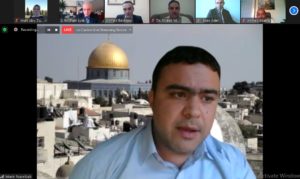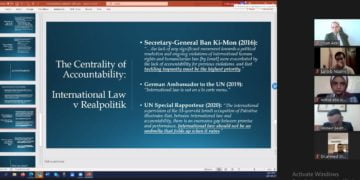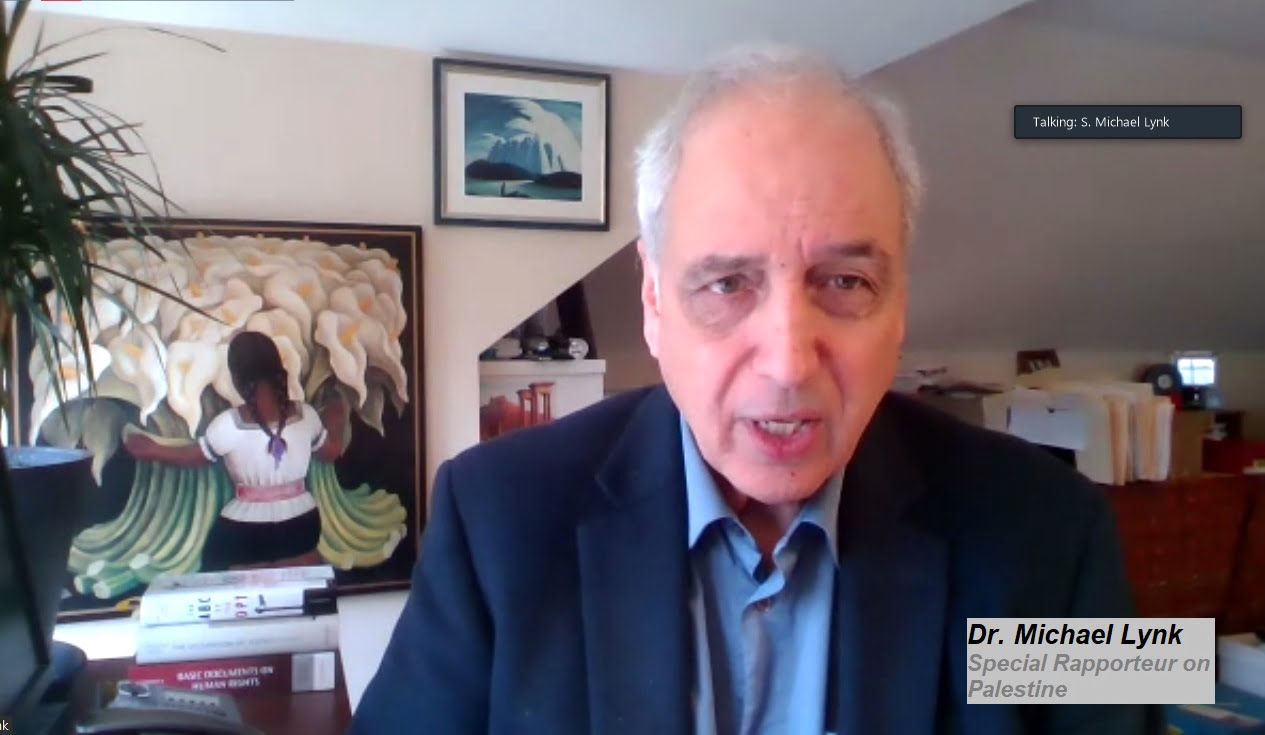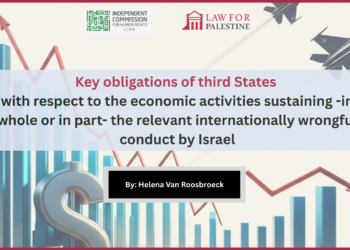United Kingdom-01/06/2021: “Law for Palestine” organized a panel discussion within the monthly webinars of its “Jurists for Palestine Forum”. The panel discussion, titled “International Community, Palestinian Self-Determination and End the Occupation: Responsibility and Accountability”, discussed the international responsibility toward the Palestinian right to self-determination and the importance of accountability for bringing the occupation to an end.
The panel discussion was held on Thursday 27 May 2021 via Zoom and hosted Dr. Michael Lynk, the UN Special Rapporteur on the Human Rights Situation in the Occupied Palestinian Territories, and Associate Professor of International Law at Western University, Ontario, Canada. The discussion composed of 23 academics from Palestinian and Middle Eastern Universities, legal specialists and human rights and political researchers, and others, and was moderated by Dr. Munir Nuseibeh, member of Law for Palestine board of trustees and Assistant Professor of Law at Al-Quds University. The webinar was followed by more than 500 members of the Jurists for Palestine Forum.

We Do Not Lack Laws, But the Implementation
According to Dr. Lynk, international law has all the necessary rules to address the Question of Palestine. International law is crystal clear about cases such as annexation, settlements and occupation, however, what is missing is the actual implementation and enforcing measures which are affected by politics rather than by law. Unlike local laws, which have local implementing courts, the implementing bodies of international law are mainly limited to the security council, international criminal court and the international court of justice, all of which has its own limitations.
Without Accountability, Power Trumps Law and Justice Become a Hollow Promise
Dr. Lynk emphasized in his intervention on accountability as the corner stone to end the occupation and achieve the Palestinian right to self-determination. As a relatively small country in terms of size and population, Israel is depending heavily on the international community both with regard to economy and security. Therefore, without the support of international community, it would have not been possible for Israel to continue with breaching international law principles for all these decades, said Dr. Lynk.
Thereafter, the key to open the titanium cage is imposing real sanctions on Israel rather than go on with declarations and condemnations without taking any actual measures to end the illegal situation.
Dr. Lynk shed light on three main rules of international law related to the responsibility of the international community toward bringing Israeli occupation accountable, these are; common article 1 of the four Geneva Conventions, articles 40 and 41 of articles on state responsibility adopted by the UN General Assembly in 2001, and article 25 of the UN Charter.

All these articles are indicating that states are not only responsible to respect international law regulations, but also to protect it and ensure that other states are respecting it. Hence, there is a responsibility on all states to not accept a situation created through illegal means, to not provide any support to the breaching state, and to take all measures they can to put an end to the unlawful situation.
Legal Rights cannot be Derived from Unlawful Acts
There is a main problem with all peace agreements and all the taken steps toward the two-state solution, which is that all these agreements are based on an unlawful condition created by Israel. Agreements such as Oslo and Trump’s latest acts all start from accepting a realpolitik situation of annexation, settlements and other breaches. Instead of bringing Israel accountable for its violations and pushing it to end its illegal acts, the international community is accepting these breaches and search for solutions within them, keeping themselves in an endless circle. Dr. Lynk reiterated again that any fruitful solution or agreement should start with accountability and end the occupation and the unlawful condition created by it.
The attendees discussed with Dr. Lynk several issues, including the extent to which states can be held accountable for their failure to hold the Israeli occupation accountable, the possible ways to speed up the investigation of the International Criminal Court in Palestine, the possibility to push for an international military intervention to end the Israeli occupation, and whether the General Assembly resolutions concerning Palestine are binding, and other interventions that Dr. Lynk discussed with the attendees during the panel discussion in a rich and structured dialogue.

This webinar comes within the monthly meetings of the Jurists for Palestine Forum, affiliated to the Law for Palestine Organization. The Forum is holding online monthly webinars gathering international experts and researchers, students, jurists and people interested in Palestine from different countries of the world to discuss topics and developments related to international law and Palestine, in addition to effectively networking between jurists interested in Palestine from all over the world.
* To attend the next monthly webinars of Jurists for Palestine Forum, you can register via the following link “here“





